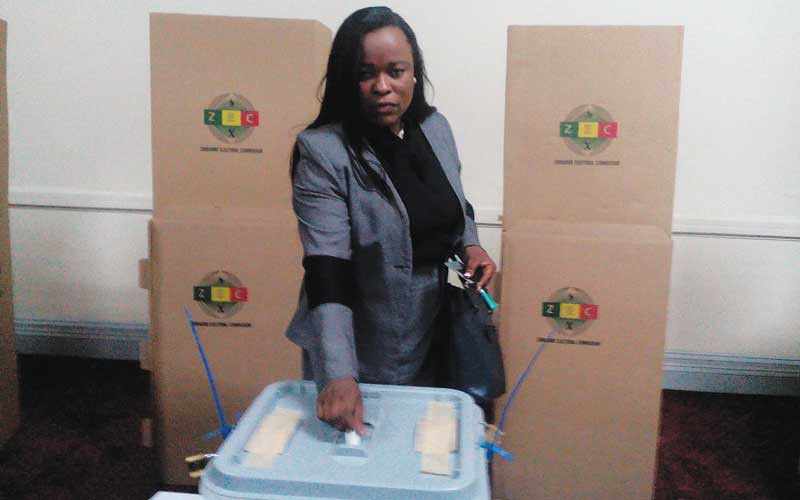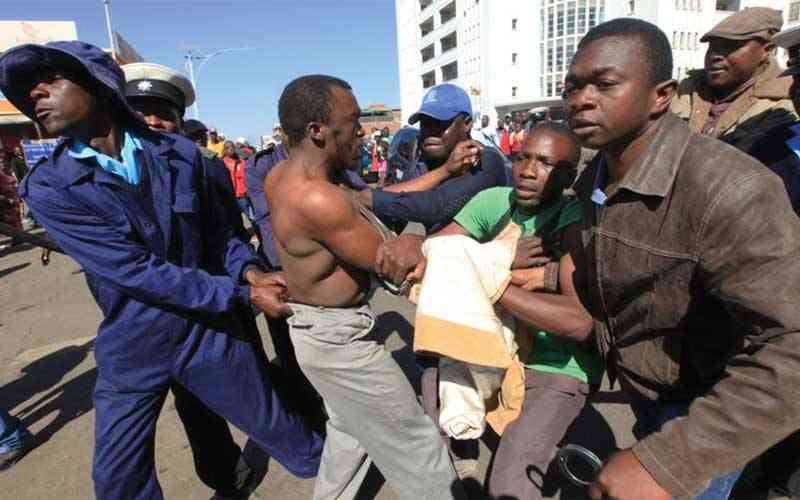
Stop govt, Zanu PF conflation WHILE corruption and misgovernance have a bearing on the chaos at most parastatals, the main problem is plunder of money and other resources at these institutions by the ruling Zanu PF party and fatcats in President Emmerson Mnangagwa’s government.
The inability to separate government from Zanu PF activities is the main problem. The party sees nothing wrong with taking money from the parastatals to finance its projects and programmes, including birthdays, weddings, congresses and election campaigns.
For Zanu PF chefs, everything that belongs to the government is theirs to use as they please.
It is not like these companies do not generate money, it is only that the money is plundered before it is accounted for.
Under such circumstances, even the best brains will not achieve anything positive in these companies.
There are many ways in which Zanu PF takes money from parastatals which include direct cash withdrawals, use of company assets at no charge, especially from Zupco. The parastatals are also forced to finance unproductive adverts and congratulatory messages for events such as President’s birthday. They are also forced to donate to party events and to lend money to well-connected people.
If you inquire from the national broadcaster ZBC, the commercial rates for flighting adverts during prime viewing time, you will discover how much parastatals are losing through flighting free adverts and congratulatory messages for events that are not relevant to their operations.
Zupco buses are hired out to ferry ruling party activists to useless Zanu PF functions such as anti-sanctions marches, but the parastatal is never paid for the service.
- Chamisa under fire over US$120K donation
- Mavhunga puts DeMbare into Chibuku quarterfinals
- Pension funds bet on Cabora Bassa oilfields
- Councils defy govt fire tender directive
Keep Reading
Under such circumstances, Zimbabwe will not achieve the upper middle income status by 2030. – Mukunda Chitova
Zimbabweans in foreign lands demand right to voteFOLLOWING intensive discussion by over 200 Zimbabweans living in Australia and New Zealand who are interested in exercising their constitutional right to vote next year, a letter was written to President Emmerson Mnangagwa on April 15, 2022.
The letter appreciated his realisation of the right to vote for Zimbabweans living in the diaspora as expressed in his address to Zimbabweans living in the United States on the sidelines of the United Nations General Assembly in September 2018, and his promise that government would expedite the matter with an aim to have Zimbabweans in the diaspora voting in 2023. The letter asked for progress that has been made on implementation of the diaspora vote as per his word, and what the challenges, if any, had been. We expected a response from the President or officials delegated by him by end of May 2022. No response has been received to date and we are still waiting.
However, we are beginning to suspect that the letter may not have been delivered to our “listening” President.
The letter was delivered both by email and hard copy to the Zimbabwean ambassador to Australia and New Zealand. We have courier acknowledgment of receipt of the letter by the Zimbabwean embassy in Canberra. Copies of the letter were delivered by email to the Clerk of Parliament, Speaker of Parliament, representatives of political parties with seats in Parliament, Sadc, the African Union and the United Nations.
We are not sure where the letter will have strayed. We will continue to explore ways that will ensure that our communication on this matter of mutual interest to Zimbabwean diaspora community reaches Mnangagwa. We look forward to the continued interest and involvement by His Excellency on matters relating to the diaspora vote. –Padmore Kufa Zimbabwe Diaspora Vote Initiative spokesperson
Africa’s food security relies on climate smart agricultureTHERE has not been a more demanding time for Africa to adopt modern agriculture methods than now. In the wake of the COVID-19 pandemic, food security in Africa is threatened at all levels and farming activities have nearly been brought to a standstill.
African farmers lost market as borders closed and flights were grounded to curb the spread of COVID-19. As a result, the pandemic severely affected agriculture value chains from supply of inputs to transporting the end product.
Africa now finds itself more in need of modern farming methods to increase production in a cost-effective manner.
However, while attempting to increase production, African farmers must also mitigate the effects of climate change by adopting climate-smart agriculture.
There is need to use improved seed varieties even in the backdrop of the side effects of using hybrid seeds. Improved seed varieties are more resistant to disease and poor weather, the yield more and they do so fast, an obvious solution to food shortage.
Modern technology is the solution to Africa’s production, harvesting and post-harvesting complications. Most small-scale farmers, who actually make up the majority of farmers, still use old methods to till their land and this hampers their productivity, especially in the face of negative effects of climate change.
Where there are cases of good production, comes the issue of storage and transportation. Farmers may get good output, but then their produce loses quality during harvesting, storage and transportation.
To improve and increase food production, there is need for concerted efforts and public-private partnership across all value chains. The private sector has the technology and the financial muscle and the government has the policy advocacy that can bridge the technology gap.
East Africa is taking steps towards adopting smart climate agriculture like the recent investment from the Climate Resilient Agribusiness for Tomorrow (Craft).
This is a multi-country project that specifically targets several legumes including soybeans and sesame as well as potatoes, sorghum and sunflower across the East Africa Community (EAC).
Funded by the Netherlands Ministry of Foreign Affairs, the five-year project advocates describe it as a climate innovation and investment facility, that will help to support performance-based investments so as to build the resilience of private sector agribusinesses and service providers in the targeted value chains.
In Tanzania, four companies have already entered into partnership pacts that are worth over €567 000.
It is envisioned that the programme will help the EAC boost its productivity, that through smart climate agriculture methods, EAC farmers can increase and sustain production for their countries food security.
The Craft project is very selective.
It only invests in companies that have demonstrated from their own internally generated funds as well as from third party providers like financiers and beneficiaries, that their businesses are viable. –The Exchange
IN response to New details emerge on police shooting, ROMINIC MHENDE says: I am ashamed and disappointed by the conduct of the Zimbabwe Republic Police in this case. The way police officers handled this case leaves a lot to be desired.
BEPETE TT says: The same thing happened at Jambanja market in Chitungwiza in 2020 when police officers shot Samson Zharare at point blank while he was selling groceries and went on to accuse him of drug dealing. While he was later acquitted, one is left wondering what kind of a police force this is.
GURAJENA says: It is high time most of our police officers undergo retaining or be discharged from the force. Some cops are now behaving like Zanu PF activists. Professionalism should be the hallmark of ZRP.
POQOZEA MOKOLO says: We need a professional police force. One that sticks to its constitutional mandate. We hope ZRP gets to the bottom of his issue and bring culprits to book.
IN response to CCC, Zapu speak on Nkomo’s persecution by Zanu PF, PEOPLES CHOICE PATRIOTIC SOCIETY says: Sowing seeds of divisions is not right for the republic. Zanu and Zapu agreed to unite and form a government of Zanu PF that ruled since 1987. We must respect the Unity Accord and cherish such historic engagement as a good example of what is good for us as a nation. Unity is delicate just like peace. Let us encourage our people to unite at all cost. United we stand, divided we fall.
EDIAS MUROMBA says: If we are not careful, Zimbabwe is going back to 1970s. After the war, the Rhodesian government asked itself what was the purpose for the war? Why we could not just have given these people the power so they can make noise in Parliament. Even South Africa under Frederik Willem de Klerk realised that waging a war was useless which would cause a lot of suffering and displacement. President Emmerson Mnangagwa and Citizens Coalition for Change leader Nelson Chamisa must sit down and talk sense to avoid the further suffering of people. At the end of it, no one wins. The ruling party should know that nothing lasts forever. At some point Ian Smith said “not in a thousand years”, but where is he now? The protagonists lose nothing by working together.











